Defence Secretary Gavin Williamson has announced new UK deployments as he acknowledges the Alliance’s importance to Europe’s defence, stability and security.
Speaking at the NATO Defence Ministerial in Brussels, the last ahead of the Summit in July, Mr Williamson committed UK jets to policing over Estonia and Iceland for 2019. He went on to announce that the UK would send 40 more UK troops to Bosnia & Herzegovina in demonstration of the Britain’s role at the forefront of European security.
Defence Secretary Gavin Williamson said:
“Whilst the UK’s relationship with the EU is changing, our unconditional commitment to European security remains resolute.
Be it our continued involvement in NATO’s Air Policing or additional UK troops assisting EU-led operations in Bosnia & Herzegovina, our actions send a clear message – we are committed to tackling new challenges and conventional threats alongside our longstanding allies and partners.”
As part of NATO’s Air Policing measures, which see NATO fighter jets ready to react 24 hours a day, 7 days a week, 365 days a year, the UK currently has four RAF Typhoons deployed to Mihail Kogălniceanu Airbase in Romania supporting security in the South and the Black Sea region.
In 2019, four RAF Typhoons will return to Estonia, where they conducted Air Policing in 2016, and, for the first time, will patrol Icelandic skies later in the year. This will allow the UK to work closely with allies to deter aerial threats to Euro Atlantic security. The mission will also provide the RAF with unique opportunities to test its skills in different environments.
On the second day, Mr Williamson announced that the UK will send 40 extra personnel to the EUFOR operation in Bosnia & Herzegovina, Operation Althea. They will join a specialist surveillance and intelligence taskforce for six months.



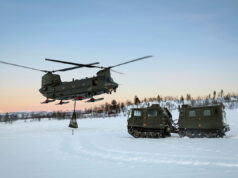

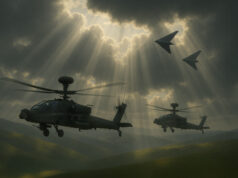
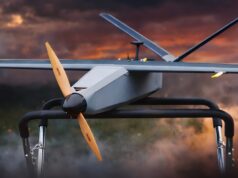
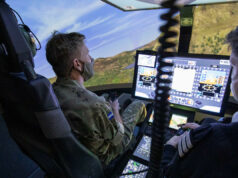
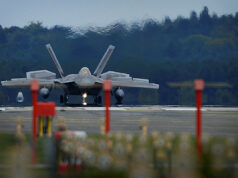
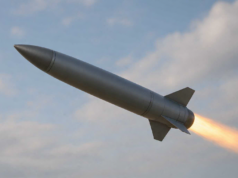


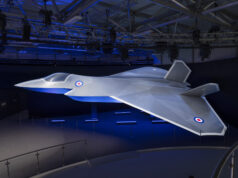

Having a butchers at the typhoons in the picture above reminded me of how I was taught how to remember the difference of Port and starboard and the colours which go with them:
“Is, there any red port left?”
Which taught me that Port is on the left and the running light is red. Thus starboard must be right and green.
I was always taught that port is the pointy end and starboard is the blunt end. Have they changed it since then !
I don’t get it… How is that a thing?
The other one I’ve heard to go along with that is “red right returning” i.e. if red is on the right it’s coming towards you (i.e. returning rather than departing).
I think this is a wise policy and will help to reassure the aforementioned countries that the UK will help to secure their airspace. However, the deployment has to have teeth and in times of tension, the commitment needs to be steadfastly held in place?
This is all about sending a message to Ivan that we will stand by even the minows in the Alliance. In effect it is not just about practicing deployment and fighting alongside the locals. It is about putting bodies in the line of fire so that the other side knows that if bullets start flying, our guys could be killed and that this would force us to retaliate in kind. So, adventurous activity will have consequences. If Ukraine would have been part of NATO and we (or the French or whoever) would have had some troops on the ground in Crimea or eastern Ukraine, Putin might have thought twice before doing what he did. Question is, will we hang around when the bullets start flying or make a quick exit?
Obama..and his weakness allowed the russian aggression
Icelandic air policing is more symbolic and more of a training exercise, air policing at Kevlavik is only intermittent. To have teeth it would need to be continuous. I’m surprised there is no permanent presence there given the significance of the Iceland Faroes gap for subs and the airborne maritime threat
HMG – quietly going about it’s business reminding everyone it is NATO that is the guarantor of peace, not the EU
?
Go to the Financial Times ‘Brussels plans to block US, UK from defence programmes’ You two are like battered wives staying with your husbands because you think it’s a sign of love !
Sorry above was intended for sceptical richard and lone survivor.
Lee you are utterly correct. The EU is a toothless tiger, lots of roar and hot wind no actual fighting prowess. It is NATO that has guaranteed the peace in Europe for the last 70 years.
Beg to disagree. First, countries that cooperate closely with each other politically and economically usually don’t go to war with each other. Second, it is not NATO per se that has guaranteed the peace. It is the military contribution made by each member of NATO, that have also chosen to collectively organise themselves into a workable and functioning military alliance, that have helped keep the peace. If an EU military alliance ever does materialise, it’ll be those same troops, ships and aircraft from those same European NATO members who also are in the EU that will provide the capability. Our military are not part of something called NATO. They are British sovereign forces, most of which are assigned to NATO. If an EU command structure were to be created, elements of our, or other countries’ military would also get assigned to the new command structure. It is interesting to note that the U.K. has gone on public record to state that in the event that an EU force structure goes ahead, they will be very keen to be part of it even when Britain is outside the EU. It would have to be organised as part of a separate Defence and Security agreement between the U.K. and the EU, but it demonstrates two things: one, that the U.K. would continue to be an important partner in the collective security of Europe, and two, that the U.K. Chiefs and the MOD recognise that there might be occasions where intervention to protect European interests might be essential but where NATO as an organisation chooses not to involve itself. I personally see nothing wrong in having two strings to your bow. It doesn’t in any way mean that you think less of the string you’ve always had, just that sometimes it might be better to have two. NATO shall continue to be our most important and primary military alliance.
Be careful with all that common sense Richard, some people on here will start malfunctioning reading it.
?
Democracies rarely – if ever- go to war against each other.
That’s why Andorra and Liechtenstein have been at peace all these years. :-0
Deployment to Bosnia is meddling in the upcoming elections.